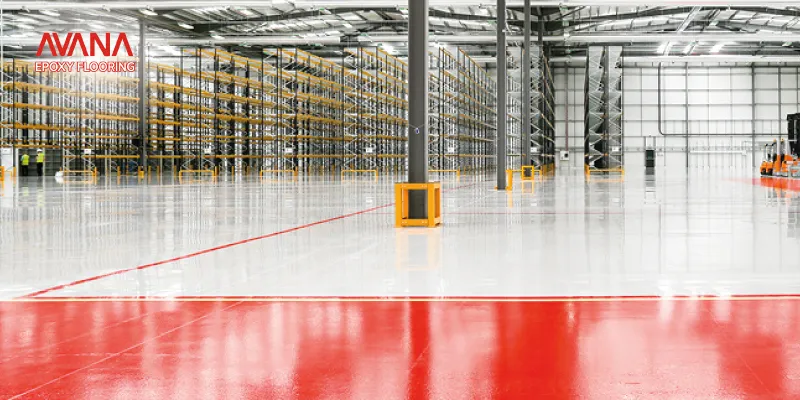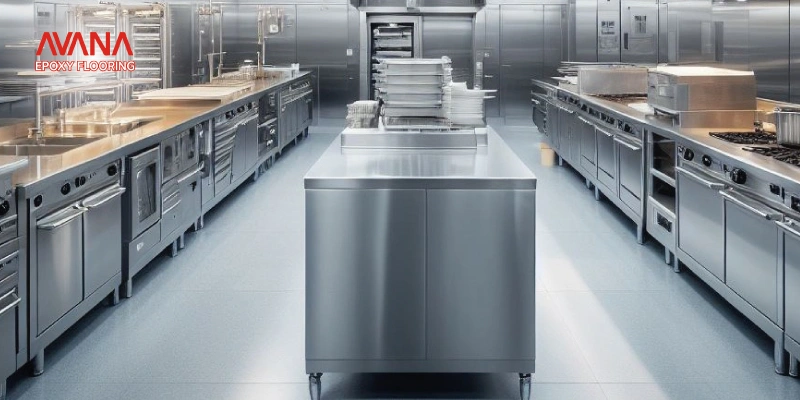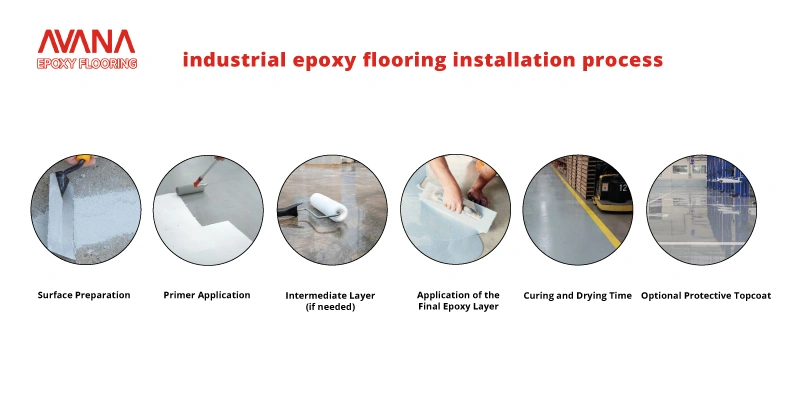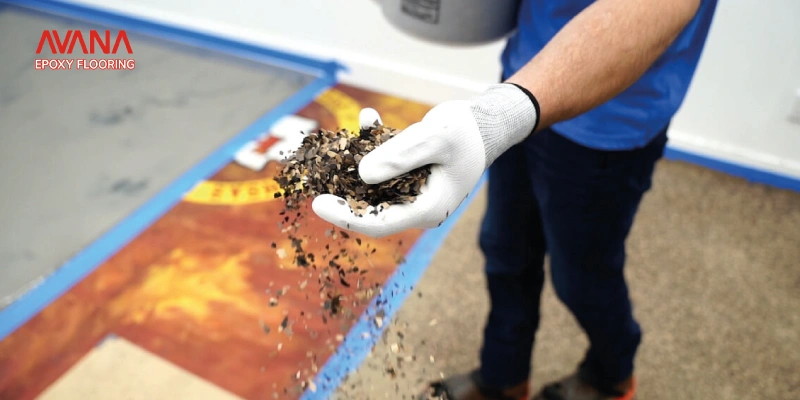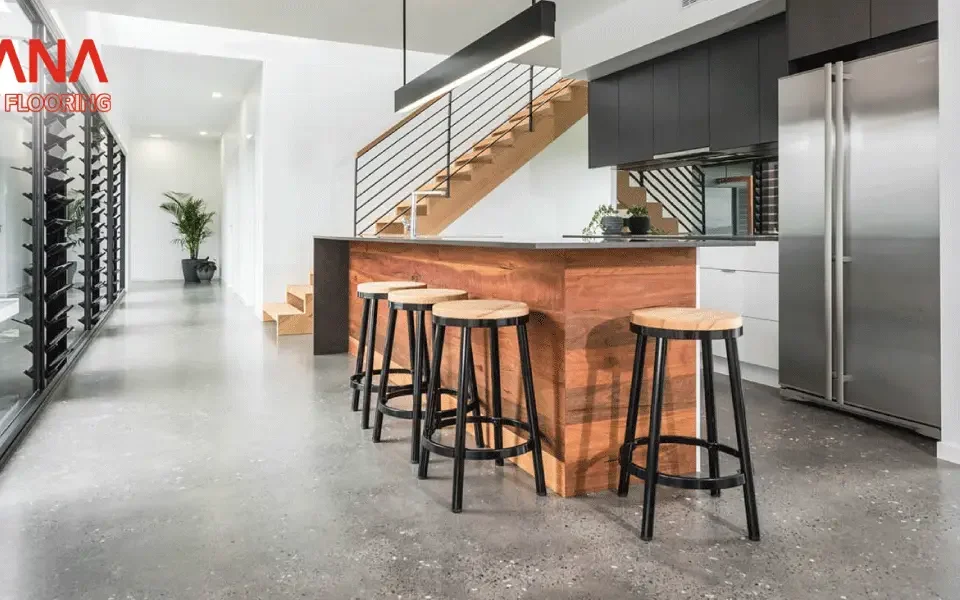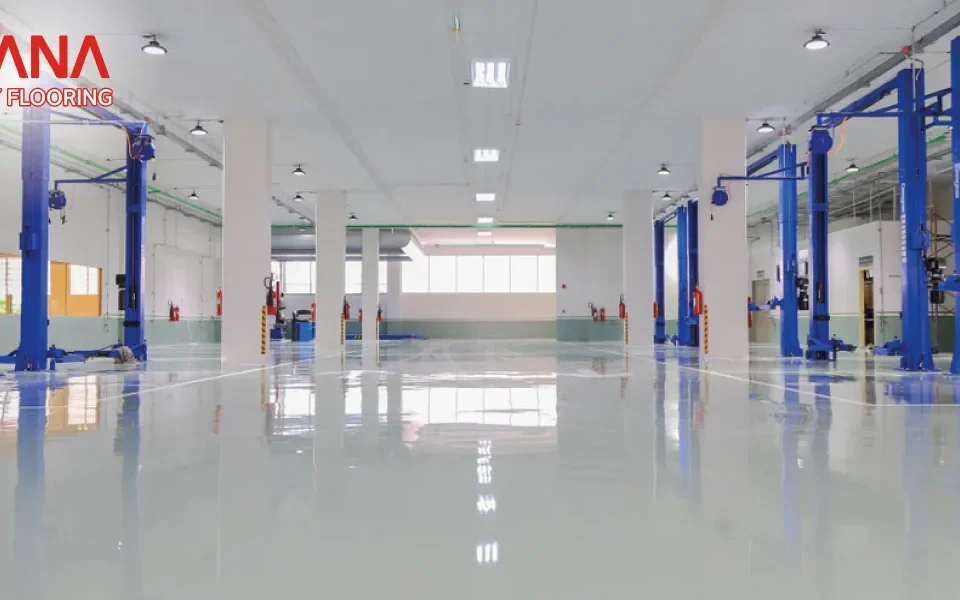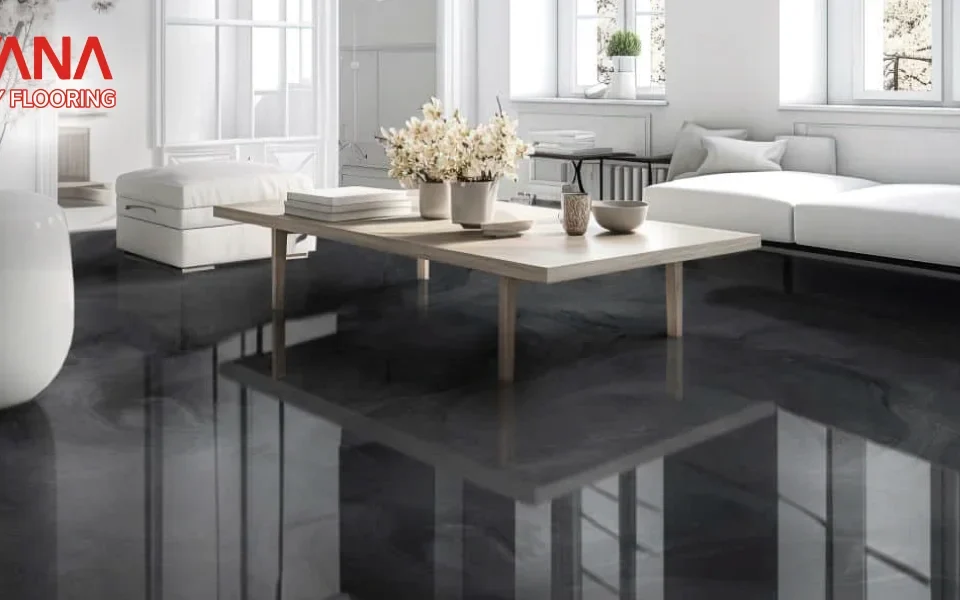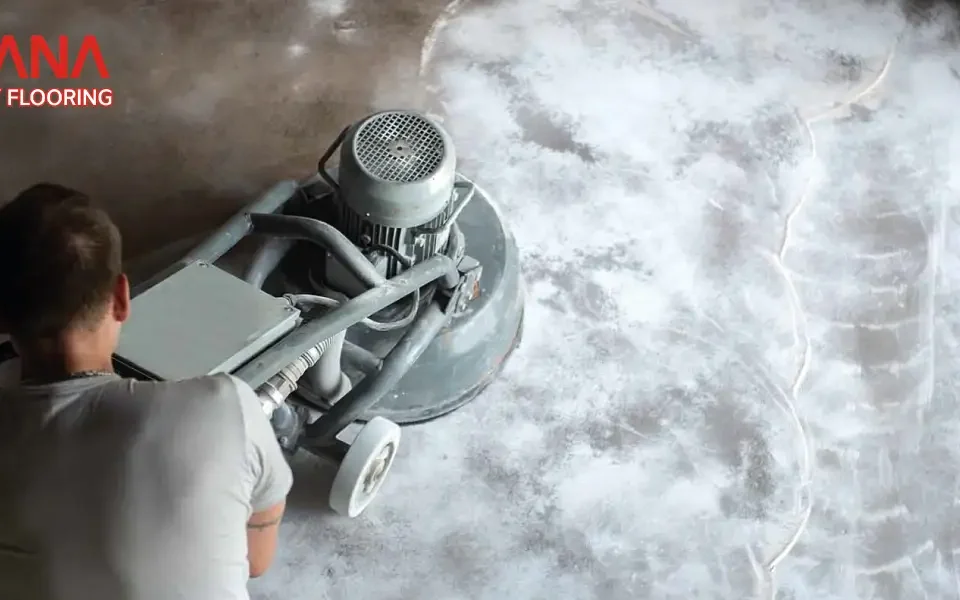In industrial environments, where heavy vehicles like forklifts and industrial machinery are constantly on the move and where exposure to chemicals such as acids, oils, greases, and other corrosive substances is common, there’s a clear need for flooring that offers high mechanical and chemical resistance.
Industrial Epoxy Flooring is designed to meet these exact challenges, providing exceptional protection for concrete surfaces against moisture, chemical spills, and physical impact.
Beyond durability, industrial epoxy flooring creates a seamless, non-porous surface that promotes hygiene and safety in the workplace. It also contributes to the overall aesthetics of industrial spaces, giving them a cleaner, more professional appearance.
In the following sections, we’ll take a closer look at the features and benefits of industrial epoxy flooring, and at the end, we’ll introduce a trusted and professional team in Brisbane that specializes in delivering high-quality epoxy flooring solutions for industrial settings.
What is Industrial Epoxy Flooring?
An industrial epoxy flooring system is a multi-layer floor coating made from a chemical combination of epoxy resin and a curing agent (commonly known as a hardener). When these two liquid components are mixed, they trigger an irreversible chemical reaction (polymerization) which results in a strong, thermosetting plastic with a tightly bonded molecular structure. This final structure creates a durable, high-performance protective layer that firmly adheres to the substrate, typically concrete.
The main components of an industrial epoxy flooring systemsuch as an epoxy cement floor, are as follows:
- Primer: This is the first layer applied to the concrete surface. Its role is to seal the pores of the concrete, improve adhesion for subsequent epoxy layers, and prevent the substrate from absorbing the resin.
- Intermediate Coat (optional): Often used in multi-layer systems to achieve greater thickness, enhanced mechanical strength, or specific performance characteristics.
- Topcoat: The final layer, which defines the floor’s ultimate performance. It provides the desired finish, resistance, and protective qualities required for the space.
Key Benefits of Industrial Epoxy Floors
In this section, we’ll walk you through the main advantages of using industrial epoxy flooring in your workspace:
1. Exceptional Durability and Long-Term Cost Efficiency
Think of epoxy flooring as armor for your factory or industrial space. It stands up impressively to heavy traffic, impacts, scratches, and abrasion. This means you won’t have to worry about frequent repairs or replacements, saving you a significant amount of money over time.
2. Reliable Chemical Resistance
If your workplace deals with chemicals, oils, acids, or other corrosive substances, epoxy flooring is your best friend. It acts as a strong protective barrier, preventing damage to the floor underneath and keeping your workspace in great shape.
3. A Seamless, Hygienic Surface for Safer, Cleaner Work Environments
Industrial epoxy floors provide a smooth, joint-free surface that’s incredibly easy to clean. Since there are no seams or cracks for dirt and bacteria to hide in, it’s perfect for environments where hygiene is critical—like food processing plants or pharmaceutical facilities.
Plus, you can choose to install a non-slip finish, reducing the risk of slips and falls and creating a safer workplace for everyone.
4. Enhancing the Look of Your Workspace
Beyond performance, epoxy flooring can truly transform the appearance of your facility. With a wide range of colors, patterns, and finishes—including options like decorative epoxy floors or even wood look epoxy floors—you can create a space that feels both clean and professional.
5. Protecting the Underlying Concrete
Epoxy acts like a shield for your concrete substrate, guarding it against moisture, chemicals, and other forms of damage. This added layer of protection not only preserves your floor but can also help extend the overall life of the building.
Common Applications of Industrial Epoxy Flooring
In this section, we’ll take a quick look at some of the most common and practical uses of industrial epoxy flooring across various industries:
1. Manufacturing Facilities
Thanks to its high resistance to heavy machinery, impact, chemicals, and abrasion, epoxy flooring is a perfect match for production environments. It also supports clear floor markings for safety and organization. Using high solids epoxy ensures added durability in these high-demand spaces.
2. Warehouses and Distribution Centers
Industrial epoxy flooring is ideal for warehouses due to its ability to handle the weight of shelving, forklifts, and other transport equipment. It’s easy to clean and resists damage from the constant movement of goods, making it a smart choice for these high-traffic areas. The use of quality epoxy floor materials helps maintain performance over time.
3. Parking Garages and Auto Repair Shops
Oil, fuel, antifreeze, and other automotive fluids are no match for epoxy. It also withstands the pressure of vehicles and the friction of tires. Plus, line striping and parking guides can be easily applied. In these spaces, nonskid epoxy can be added for extra grip and safety.
4. Laboratories and Pharmaceutical Facilities
Epoxy provides a seamless, non-porous surface that prevents contamination and supports easy sterilization. Its chemical resistance and hygiene properties make it an excellent flooring solution for sensitive industries like biotech and pharma.
5. Food Processing Plants and Industrial Kitchens
In environments exposed to moisture, oils, strong cleaners, and heat, epoxy holds up exceptionally well. Its impermeable surface makes cleaning and sanitizing a breeze. In some settings, epoxy stone flooring is also used to add texture and slip resistance while maintaining hygiene standards.
6. Hospitals and Healthcare Centers
Hospitals require floors that are extremely hygienic, easy to clean, and resistant to disinfectants. Epoxy flooring checks all those boxes, offering a smooth, bacteria-resistant surface that supports a clean and sterile environment.
Industrial Epoxy Flooring Installation Process
In this section, we’ll walk you through the installation process of industrial epoxy flooring. Whether you’re applying it in a warehouse, garage, or production facility, getting each step right is key to a durable and high-performance surface.
1. Surface Preparation
The first and most critical step in installing an epoxy finish concrete floor is surface preparation. The substrate—usually concrete—must be completely clean, dry, and free of any dust, oil, grease, or contaminants. Industrial surface grinders, like diamond grinders or shot blasters, are typically used to roughen the surface, which helps the epoxy bond better.
If there are any cracks or joints, they need to be properly repaired before moving forward.
2. Primer Application
Next, a primer layer is applied to seal the concrete’s pores and improve adhesion for subsequent layers. This is usually done with a roller, and it’s an essential base coat to ensure the epoxy based paint performs as intended.
3. Intermediate Layer (if needed)
If the floor requires extra thickness or mechanical strength, one or more intermediate layers may be added. These layers are often reinforced with fillers like silica to boost durability while reducing costs.
In high-traffic or heavy-load areas, it’s common to use high-solids epoxy for enhanced performance. At this stage, using epoxy flex systems can also help manage substrate movement or slight shifts in the concrete base.
4. Application of the Final Epoxy Layer
This is the top layer of your epoxy flooring system and gives the floor its final properties—chemical resistance, abrasion resistance, UV stability, anti-slip texture, and aesthetic finish.
The epoxy mixture is poured over the primed or intermediate layer and spread evenly using rollers, brushes, or trowels. To ensure an even thickness, tools like a notched rake (rake) are often used.
Sometimes, air bubbles may form during application. These can be removed with spiked rollers while the epoxy is still wet.
5. Curing and Drying Time
Once the final coat is applied, the epoxy needs time to cure properly. Depending on the type of product, layer thickness, and environmental conditions (temperature and humidity), initial drying can take between 24 to 72 hours.
During this time, the surface must be protected from traffic and moisture. Full chemical resistance and mechanical strength typically develop within 5 to 7 days.
6. Optional Protective Topcoat
In some cases, especially where UV exposure or harsh chemicals are a concern, an additional topcoat such as polyurethane is applied. This extra layer helps improve durability and long-term performance, especially in demanding industrial environments.
How to Maintain Industrial Epoxy Floors?
Industrial epoxy flooring is known for its durability and long lifespan, but like any surface, it requires proper care to keep it looking and performing its best over the years. Here are a few essential tips to help you maintain your epoxy floors effectively:
- Clean the surface regularly using a soft broom or a microfiber mop to remove dust, dirt, and debris. Avoid using harsh or acidic cleaners, as they can damage the epoxy coating over time.
- Wipe up spills immediately, especially oil, chemicals, or any liquids. The longer a spill sits, the harder it becomes to clean—and the higher the chance of it staining or damaging the surface. Use a soft cloth or sponge to clean up.
- Use non-abrasive cleaning pads when washing the floor. Avoid rough scrubbers or steel wool, as they can scratch the surface and dull the shine of the epoxy finish.
- Avoid dragging sharp or heavy objects across the floor whenever possible. If you need to move heavy items, use rubber wheels or place protective padding underneath. Also, try to prevent tools or heavy items from dropping directly onto the surface.
- Inspect the flooring regularly for any signs of cracks, wear, or damage. Catching and fixing small issues early can help you avoid bigger, costlier repairs down the road. For more serious damage, it’s best to consult with a professional.
- Skip the steam cleaner. Excessive heat and moisture from steam cleaning can slowly degrade the epoxy over time, so it’s better to stick with gentle cleaning methods.
Cost of Industrial Epoxy Flooring
The cost of industrial epoxy flooring can vary based on several factors, such as the type of epoxy used, the thickness of the application, total surface area, condition of the existing floor, material costs, labor fees, project location, and the number of layers required.
For an accurate estimate tailored to your specific project, simply visit our Industrial Epoxy Flooring Cost Estimation page and enter your details. One of our specialists will get in touch with you shortly to answer all your questions and guide you through the next steps.
Conclusion
This article aimed to share valuable insights about industrial epoxy flooring. We hope these tips have helped you gain a clear understanding of this durable and efficient flooring solution.
One key point to remember when planning your epoxy flooring project is to work with a professional and experienced contractor. AVANA Epoxy Flooring is a trusted specialist in installing high-quality epoxy flooring systems for a wide range of industrial and commercial spaces, offering excellent workmanship at fair and reasonable prices.
To learn more about AVANA Epoxy Flooring and explore how we can support your project, feel free to visit our homepage and leave your contact information. One of our team members will get in touch with you shortly.


